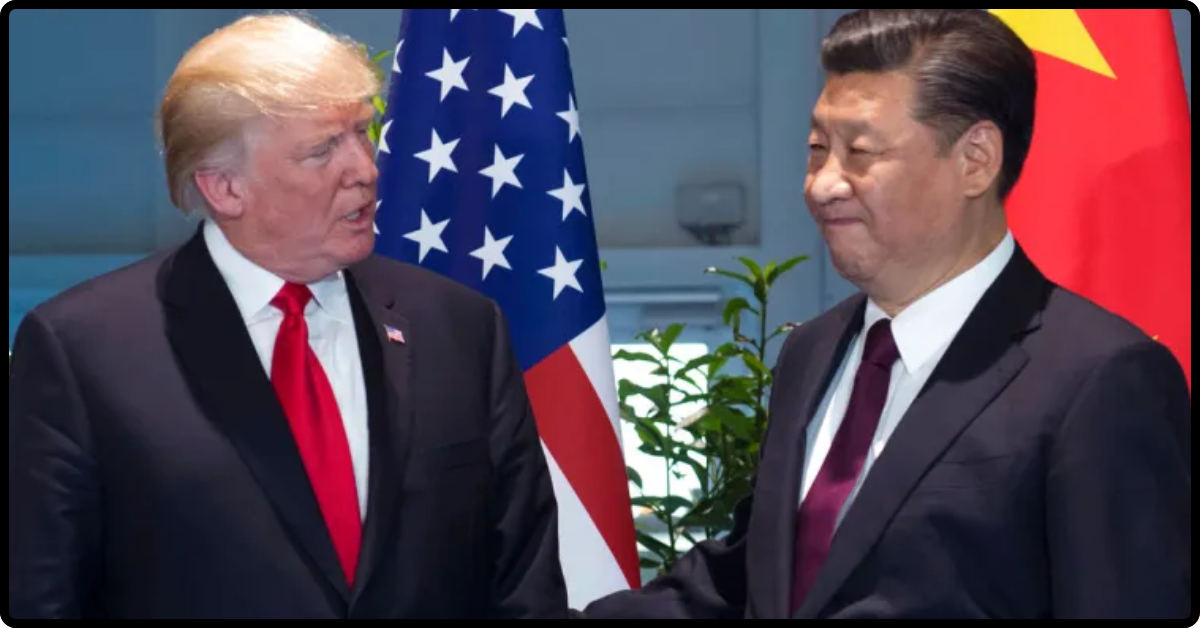China hits back at US after Washington’s new export bans and student visa revocations, accusing it of violating the Geneva tariff truce. Trade tensions resurface in 2025.
China Hits Back at US Over Tariff Truce Breach: Rising Tensions in 2025 Trade Dispute
China hits back at US amid rising economic tensions, accusing Washington of seriously violating the recently agreed Geneva tariff truce. In a strong statement released by the Chinese Ministry of Commerce, Beijing slammed the United States for introducing a slew of restrictive measures, including AI chip export bans, a halt on advanced chip design software, and the revocation of student visas for Chinese nationals.
The move comes just weeks after both nations reached a fragile 90-day tariff ceasefire aimed at reducing friction between the world’s top two economies. But the sudden shift in US policy has reignited fears of a renewed US-China trade war in 2025.
China Hits Back at US : What Sparked the Conflict?
In an official release, China stated that the US has seriously undermined the trade consensus reached during last month’s Geneva talks. Specifically, Washington implemented:
-
Export control guidance restricting AI chip shipments to China.
-
A ban on the sale of chip design software to Chinese tech firms.
-
A decision to revoke student visas for Chinese nationals, particularly those in “critical fields” or allegedly linked to the Chinese Communist Party.
These moves, Beijing argues, violate both the letter and spirit of the Geneva agreement and amount to a deliberate escalation of hostilities.
Visa Revocations Draw Strong Reaction
One of the more controversial US actions is the revocation of Chinese student visas. US Secretary of State Marco Rubio announced on May 29 that visas of certain Chinese students—particularly those in science, technology, engineering, and mathematics (STEM)—would be revoked.
This sudden action affected around 270,000 Chinese students in the US, forcing many to reassess their academic plans. By connecting student mobility to geopolitical disputes, China says the US is weaponizing education for political purposes.
Chinese Ministry’s Response
A spokesperson from the Chinese Commerce Ministry stated:
“These actions severely violated the consensus reached during the leaders’ phone call on January 17. The US has unilaterally provoked new trade frictions, increasing instability and uncertainty.”
The Geneva Tariff Truce: What Was Agreed?
The Geneva agreement between China and the US in May 2025 was seen as a breakthrough after years of escalating tariffs. The agreement reduced tariff rates significantly:
-
The US dropped tariffs on Chinese imports from 145% to 30%, covering approximately $439.9 billion in goods.
-
China reduced its tariffs from 125% to 10% on $143 billion worth of US goods.
Both nations also pledged to remove non-tariff barriers and engage in mutual cooperation to resolve longstanding trade issues. However, the US has since been accused of violating this trust through backdoor restrictions.
Trump’s Accusation and China’s Sharp Retort
Former President Donald Trump took to social media to claim that “China had totally violated its agreement with us.” However, his post lacked specific details. Later, Trump said he planned to speak with Chinese President Xi Jinping but insisted that the US would adopt a tougher approach if necessary.
Trump wrote:
“The bad news is that China, perhaps not surprisingly to some, HAS TOTALLY VIOLATED ITS AGREEMENT WITH US. So much for being Mr. NICE GUY!”
Hours after Trump’s remarks, China hit back at the US, labeling the accusations groundless and misleading.
Also Read: D Gukesh Stuns Magnus Carlsen with Dramatic Win at Norway Chess 2025 – Emotional Outburst
US Trade Office: China Yet to Lift Countermeasures
Supporting Trump’s claims, US Trade Representative Jamieson Greer told CNBC that while China had lowered tariffs, it had not removed all countermeasures:
-
Some US companies remain blacklisted in China.
-
Beijing still maintains export restrictions on rare-earth minerals, crucial for manufacturing electronics, electric vehicles, and defense systems.
“They removed the tariff like we did, but some of the countermeasures they’ve slowed on,” Greer said.
Rare Earth Restrictions: A Strategic Tool
China’s refusal to lift its rare-earth export ban remains a point of contention. These minerals are critical for high-tech manufacturing, making them a powerful tool in the trade dispute.
China controls over 60% of global rare-earth production, and its continued export controls could severely impact industries worldwide, including:
-
EV and battery manufacturers
-
Semiconductor firms
-
Aerospace and defense sectors
China Hits Back at US: Strong Words and Serious Warnings
In its most direct language yet, China hit back at the US with the following message:
“Instead of reflecting on its own actions, the US has groundlessly accused China of violating the consensus, a claim that grossly distorts the facts. China firmly rejects these unjustified accusations.”
The statement continued:
“China is firm in safeguarding its rights and interests, and sincere in implementing the Geneva consensus. But if the US side insists on going the wrong way, China will resolutely take forceful measures to protect its legitimate interests.”
For detail news, Click here!
Will Talks Collapse Again?
The growing list of retaliatory actions, aggressive rhetoric, and accusations could derail months of diplomatic progress. While both sides previously agreed to dial down their trade war, the resumption of hostile measures may trigger another cycle of tariffs and sanctions.
Global markets are already reacting to the uncertainty, especially in technology, semiconductor, and education sectors.
The situation remains fluid, but one thing is clear: China has hit back at the US, strongly opposing Washington’s latest actions that Beijing considers violations of the Geneva tariff truce. As accusations fly and measures pile up, the risk of a full-blown trade war in 2025 is once again on the horizon.
The coming weeks will be critical. Will Washington and Beijing return to the negotiating table, or will mutual distrust drive a permanent wedge between the two global giants?
